Ba Jin
Chinese Anarchist Writer and Critic of the Chinese Communist Party
(1904 - 2005)
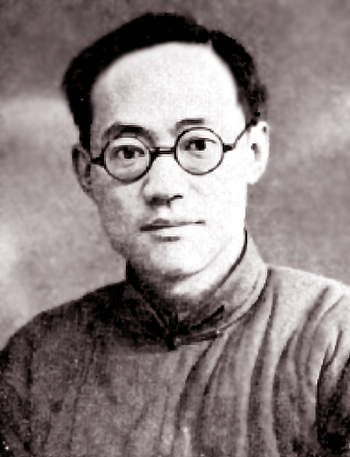
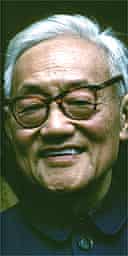
About
Ba Jin (Chinese: 巴金; pinyin: Bā Jīn; 25 November 1904 – 17 October 2005) was a Chinese writer and author. He also wrote three original works in Esperanto. As a political activist he also wrote The Family.
France (1927–1928)
On graduation, he left on board a liner on February 15, 1927, with a friend for Paris, France, for further studies, where he lodged at the 5th arrondissement (three months at Rue Banville, then Rue Tournefort, No. 2). He described his life there as boring and monotonous, taking daily afternoon walks at the Jardin du Luxembourg and evening French lessons at Alliance Francaise. He recalled especially Rousseau's statue at the Panthéon ("I almost knelt before it...he whom Tolstoy described as the conscience of the 18th century"), the River Seine and the tolling of the Notre Dame. In Paris, Ba Jin writes:
"In spring 1927, I was living atop a five-storied apartment at Paris's Quartier Latin, a small lodging full of gas and onion smell. I was lonely, I felt pain, sunlight hardly shone into my room: I missed my homeland and my family." It was partly owing to boredom when Ba Jin began to write his first novel, Miewang 灭亡 (“Destruction”). In France, Ba Jin continued his anarchist activism, translated many anarchist works, including Kropotkin's Ethics, into Chinese, which was mailed back to Shanghai's anarchist magazines for publication. Alexander Berkman was one of many anarchist leaders he met there.
The trials of Italian immigrants Sacco and Vanzetti made Ba Jin angry, and he campaigned for their release. Vanzetti apparently was moved enough to reply to Ba Jin from his American prison, with a package of anarchist texts for his readings. Their short correspondence ceased when Vanzetti was executed, along with Sacco, on August 23, 1927. Ba Jin published in late 1932 the short story Dianqi 电椅 ("The Electric Chair"), to protest against their execution.
Shanghai and later life On his return to Shanghai in 1928, Ba Jin continued writing and working on translations. His first novel, Destruction, was released serially by Fiction Monthly in 1929, a literary magazine.
During the next 10 years, Ba Jin acted as editor to several important publishing firms and periodicals, as well as composing the works which he is best known for – The Family (1931), The Love Trilogy Fog (1931), Rain (1933) and Lightning (1935), the novellas Autumn in Spring and A Dream of the Sea, the short story collection Mengya 萌芽 (“Germination”) and prose writings in Fuchou 复仇 ("Vengeance") and Shen, Gui, Ren 神, 鬼, 人 ("Gods, Ghosts and Men").
During the Second Sino-Japanese War, Ba Jin was actively involved in propaganda work against the Japanese invasion, working on the publication Nahan 呐喊 (“Outcries”, later renamed Fenghuo 烽火, “Beacons”) with Mao Dun. In the later stages of the war, Ba Jin completed the Torrents Trilogy — of which The Family (1931) was the first written — with Spring (1938) and Autumn (1940). Other works of the post-war period, like the short novels A Garden of Repose (1944), Ward Four (1946) and Cold Nights (1947), contain some of his strongest writing. He ceased fiction writing after the establishment of the People's Republic of China, choosing to concentrate on nonfiction instead.
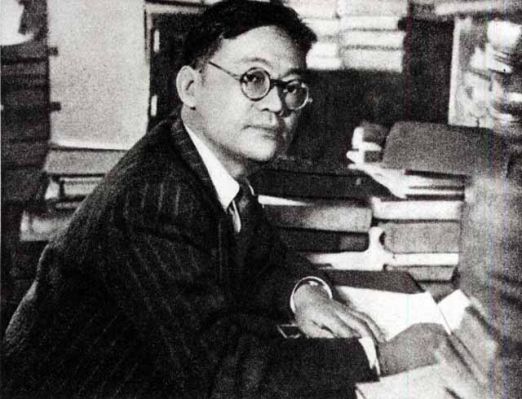
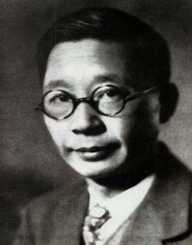
During the Cultural Revolution, Ba Jin was heavily persecuted as a counter-revolutionary. His wife since 1944, Xiao Shan, died of cancer during the Revolution after being denied medical care, and the manner of her death traumatized Ba Jin for the rest of his life. He was rehabilitated in 1977, after which he was elected to many important national literary posts, including chairman of the Chinese Writers' Association (since 1983). The most significant work of his later years is the discursive writings in Suixiang Lu (translated as "Random Thoughts", five volumes, composed between 1978 and 1986), in which, among other things, he reflected on the Cultural Revolution in a painfully honest manner and asked specifically for a Cultural Revolution Museum to be set up as a deterrent for future generations. The Shantou Cultural Revolution Museum referenced the influence of Ba Jin on its establishment through displaying a quote of his, "Every town in China should establish a museum about the Cultural Revolution."
Ba Jin's works were heavily influenced by foreign writers, including Émile Zola, Ivan Turgenev, Alexandr Herzen, Anton Chekhov, and Emma Goldman, and a substantial amount of his collected works are devoted to translations. His writing style, characterized by simplicity, avoids difficult, abstruse words, making him one of the most popular of all modern Chinese writers.
Ba Jin suffered from Parkinson's disease beginning in 1983. The illness confined him to Huadong Hospital in Shanghai from 1998, and left him unable to speak and walk during the last few years of his life. Ba Jin died of cancer in Shanghai at the age of 100 (101 by Chinese reckoning) in 2005. His death marked the end of an era for Chinese literature, especially since he was the last major writer to live through the May Fourth Movement. He received the Fukuoka Asian Culture Prize in 1990.
Asteroid 8315 Bajin is named in his honor.
Source: Wikipedia.org
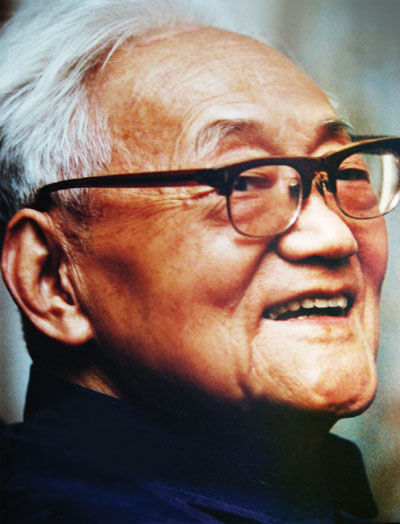
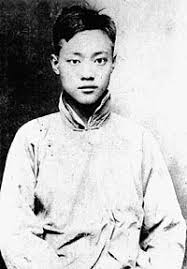
Articles
1921: How Are We To Establish A Truly Free And Egalitarian Society?
1921: Nationalism and the Road to Happiness for the Chinese
1949: Letter from Ba Jin to the CRIA
1958: A Battle For Life
1986: A Museum of the "Cultural Revolution"
Unknown: When the Snow Melted
Unknown: Anarchism and the Question of Practice
Unknown: The anarchist movement in Japan : The martyrs of Tokyo